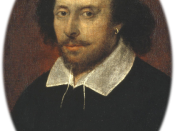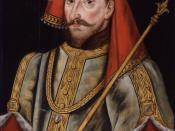The concept of absolute monarchy comes into existence
during the early seventeenth century. During this time,
most countries were ruled by a single family. The head of
that family, a count, duke, king or queen, was in control.
The English Monarchs at this time included the Plantagenet
and Lancaster dynasty. From these two dynasties came
Richard II and Henry IV, two of England's finest kings.
Shakespeare, inspired by the ruling of these kings,
constructed two distinct plays, Richard II and Henry IV.
Throughout these plays it is evident that Shakespeare does
not agree with the idea of having an absolute monarchy, and
especially does not agree with the way these kings rule.
There are several obvious clues in Richard II that
suggests Shakespeare disapproved of the way Richard ruled
his country. During the feud between Bolingbroke and
Mowbray, Richard makes a split second decision to bring the
duel to a halt and suggests banishing the two from England
instead. Richard thoroughly contemplated his decision only
to make himself look more appealing to the people of
England. If he halts and condemns the duel, he is
promoting peace, which is supported by all. His sentence
for Mowbray was to be banished from England forever but
Bolingbrokes sentence was only banishment for seven years.
Richard knows that he must not anger the supporters of
Bolingbroke, in fear that Bolingbroke is next in line as
King. Richard flaunts a fake and phony King in this
scene. Richard has no cares for his people, just for his
own popularity.
In Act II Scene I, Richard goes to visit John of
Gaunt on his deathbed. Gaunt attempts to give Richard some
wise advice, but Richard rebuts with anger. Gaunt tells
Richard that "this blessed plot, this earth, this realm,
this England," will go to ruins if Richard does not take
his advice. Gaunt continues by telling Richard that he is
wasting money, raising taxes too high and overcome by
flattery. Richard, furious with anger, remains still as
Gaunt turns his back on him to retire to his bed. The Earl
of Northumberland, soon after, reports that Gaunt has
passed. The first thing on Richards to-do list is to seize
all of Gaunt's property.
Richard tends to abuse the fact that he has the
most power. He refuses to accept anyone's opinion and
constantly feels that his method is the right method.
Richard bases all of his actions on how much popularity it
will bring to him. He does not care about the people of
London. His only concern is himself.
The next king to take the throne is Henry IV, whom
overthrew Richard II. While Richard was more concerned
about his popularity with the people of London, Henry was
more concerned about his relationship with the people of
London. Although courteous, Henry has a bad temper and
tends to boast about himself. Henry, as king, has a right
to all noble prisoners captured in battle, yet Hotspur
refuses to yield to the kings demands and keeps his
prisoners hostage. Henry meets with Hotspur in hopes of
negotiation, but Hotspur still declines. With this, Henry
has had enough and speaks to Hotspur in a very threatening
manner. Henry then tells Hotspur that if he doesn't
eventually let the prisoners go he will face severe
retribution. Although fierce in his words, Henry is worn
down and exhausted from war. He is tired and aging.
Henry then continues to boast about himself when
speaking to his son, Harry, about his foolish behavior.
Henry tells his son that he didn't slum around London and
was always courteous and regal, unlike Harry. He then
compares Harry with Richard II, which poses some irony
because Henry is not exactly a greater king than Richard.
Henry then goes on to compare Harry with Hotspur as well.
Henry's plan is to get Harry riled up in hopes that he will
take revenge on Hotspur, which is successful.
Shakespeare obviously did not believe in the idea
of an absolute monarchy, otherwise he would not present the
kings in the fashion that he did. He characterized the
kings as brutal bastards. Not once, were the kings praised
for the good deeds they had performed. Many of the acts
centered around a conflicting problem dealing with the king
at the time. Shakespeare depicted these kings the way they
really were. He had no shame poking fun of them and did it
rather well.


